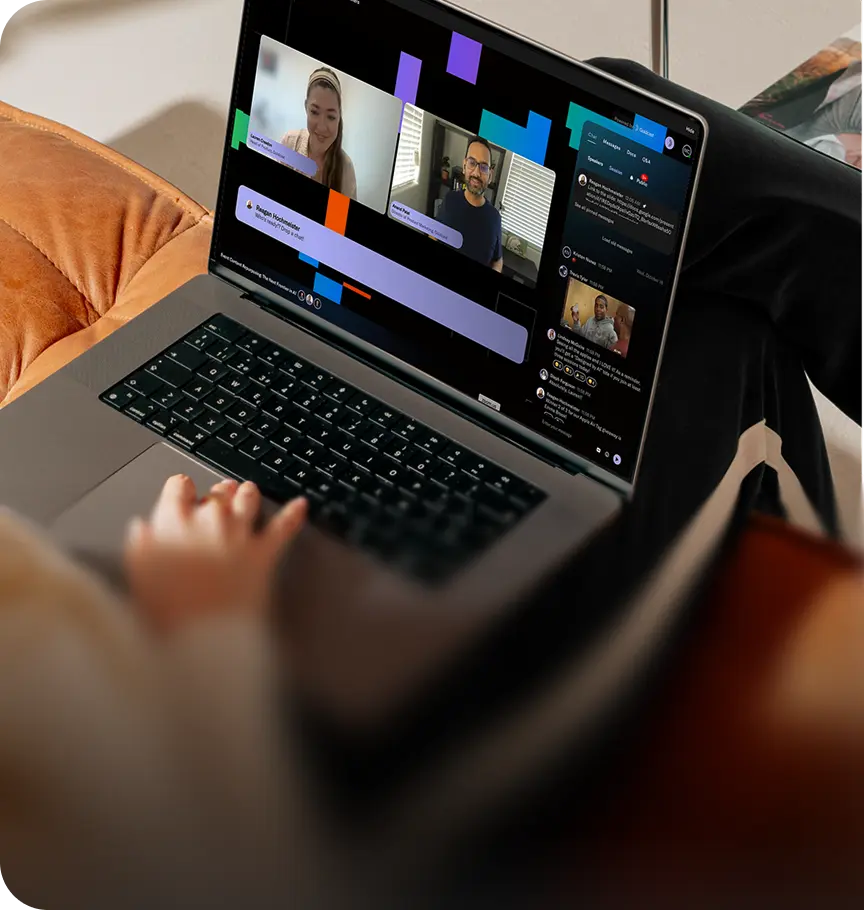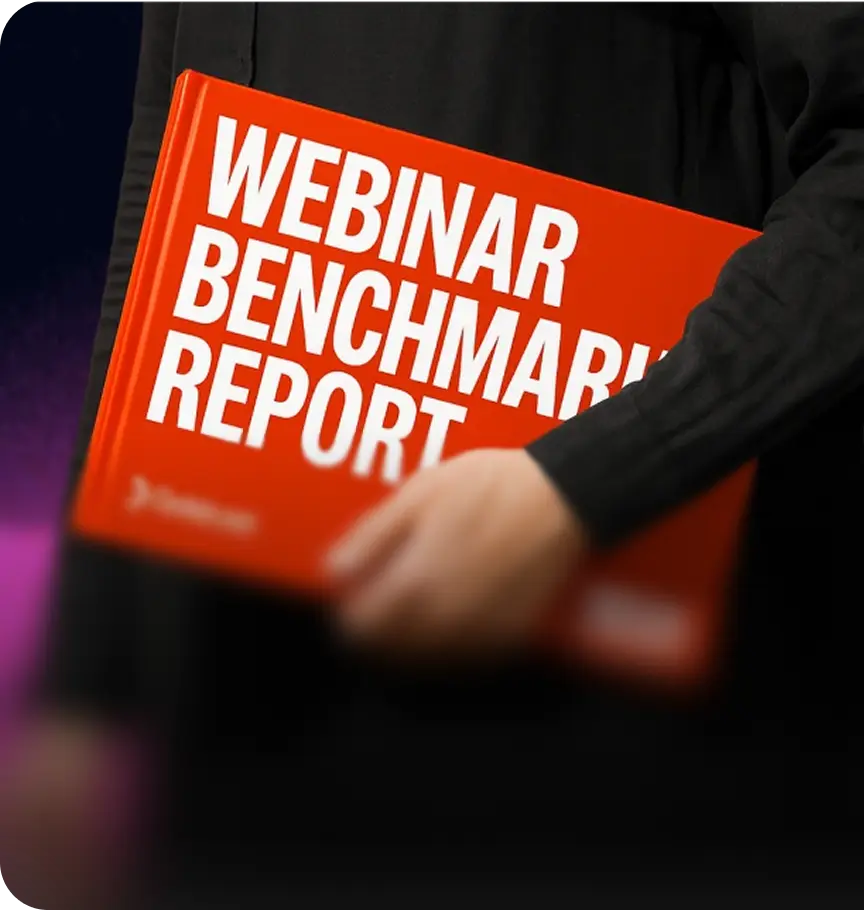Want Thought Leadership Content? Start With Expert Interviews

Table of Contents
Maximize Your Marketing ROI
Join 10,000 other marketers already getting the best tips on running engaging events that boost pipeline and create raving fans.
Every B2B brand wants to be a thought leader, but we've noticed a strange phenomenon. Most companies are sitting on a mountain of insights that they never share with the rest of the world.
Here's the thing: Thought leadership isn't created — it's extracted. The best insights are already there, within your company, being exchanged in conversations between smart folks. Most brands are consistently leaking value every week by letting those golden moments disappear into the void afterward!
By the end of this blog, you'll walk away with a repeatable system you can use to capture and amplify thought leadership content. Let's get started!
Subject matter expert (SME) interviews are your secret weapon
What if your best content strategist isn't a content marketer, but a SME?
SMEs, whether internal or external, inherently hold the domain expertise, credibility, and hard-won POVs that your audience craves. These SMEs have been in the trenches, like your customers, and they know how to solve the hard problems.
Buyers trust humans — particularly expert humans — over brands, and they want to be given real stories, not more AI fluff. However, most companies only leverage SME insights for internal enablement, not external brand building.
Don't make this mistake!
Instead, create video content that features those SMEs. We believe video is always the best way to win Mindshare —your audience's valuable mental real estate — which is your main goal with thought leadership content.
Video is the format that engages audiences more readily, and studies have shown that video content has a 95% retention rate, versus just 10% for text content. That's perfect because you want folks to remember you long after they've viewed your video!
Try this 5-part thought leadership framework
Turning expert convos into compelling content requires a systematic process to capture the content, repurpose it into other assets, and distribute it effectively across channels. We've been refining this framework since we started, and these are the five steps we use every time to achieve our goals.
As an added bonus, this process doesn't require you to make any big investments right now. You don't need fancy equipment or an external agency to get the job done; it's much simpler than that. Read on for the full checklist!
Step 1: Plan ahead
While some interviewers are good at navigating impromptu conversations, the best conversations usually start with intention.
Start by identifying topics that address specific pain points or questions your audience wrestles with. Talk to your sales team and find out what prospects talk about the most. Review customer feedback. Pay attention to LinkedIn posts and comments, as well as industry forums and Slack communities where your audience hangs out. These can all give you fresh ideas of what to talk about.
Next, decide who you'll interview. Title matters less than firsthand experience; sometimes your C-suite leaders are too removed from the day-to-day challenges your prospects face to be relatable. In that case, a middle- or senior-level manager might be a better choice.
Once you've landed on your interview subject, set everyone up for success. Create a lightweight preparatory brief — we like to go with three bullet points and a few guiding questions, so that the interviewee knows what to expect. The idea is to inform your guest but still allow the conversation to be organic and flow naturally; you don't want things to sound scripted!
Step 2: Record like a podcaster
Treat your conversation like a podcast recording; that is to say, be conversational, human, and relatable. Don't be afraid to wander off script if the conversation demands it; you can always edit things out later on if they don't make sense in the overall context of the conversation.
Keep your emphasis on the storytelling aspects of the discussion. A couple of helpful frameworks we like to use are:
- Past/present/future: Ask about the way things used to be for the SME, the way they are now, and where they see things going. This can present a clear story arc for listeners.
- Mythbuster/reality: Dive into common misconceptions around a topic, and have the interviewee explain the reality and any real-world examples that demonstrate it.
Choose a tool that records both audio and video in high-quality like the Goldcast Recording Studio, which was designed specifically for B2B creators who want a one-stop shop to capture content and then repurpose it into other content formats. The intuitive interface lends itself well to DIY recording and editing, and features like text-based editing make it easy to master post-production.
Ready to level up?
Step 3: Use AI to revolutionize post-production workflows
The real magic happens after you stop recording! This is the point where modern AI tools get involved and start to transform your recording into a full-on content engine.
Upload your recording to an AI-enabled platform like Goldcast Content Lab or Descript, where you'll get instant transcripts, highlight reels, and drafts you can use for social posts and blogs (more on that soon).
With a tool like Content Lab, it's easy to scroll through the soundbites and see which ones grab you. You can also use the handy editing tools to generate your own clips and captions, apply branding to the clips, search for keywords, and more. What used to take a video production team and days of work now takes just minutes!
Step 4: Repurpose 30 minutes into months of content
One interview can generate months of content if you go about it the right way.
Use Content Lab's repurposing capabilities to create the following:
- Longform video for YouTube: Don't miss out on the chance to boost SEO via your transcript and video description on YouTube.
- 3-5 snackable clips for LinkedIn and other social media channels: You should definitely be posting on LinkedIn as a B2B brand; this is the place most of your audience hangs out!
- Written blog: Weave in key takeaways and direct quotes from your interview for the text-based learners.
- Carousel or infographic: Use the main points of the interview to create a shareable infographic you can drop in blogs, social posts, and other places.
- Email campaign: Take the best moments or key points of the session and draft an email series promoting the content or another CTA.
With this approach, you're crafting multimodal content to meet people where they are. If someone prefers to receive content in their email inbox, you're there. If they'd rather watch a video on social media, you're there too, building Mindshare and sparking new conversations.
Step 5: Don't forget distribution!
Creating the content is only half the battle. Making sure people see it is where many teams drop the ball.
Start by embedding the full video on your blog, not just YouTube. This can keep visitors on your site longer and gives you more control over the viewing experience, CTAs, and other content suggestions.
Take the social clips you generated and schedule them across the next few weeks. You want to consistently talk about the same core topics, not overwhelm your audience with a ton of consecutive posts about the same thing. And if you feel like posting about the same thing for a month is strange, remember that most of your followers haven't seen your content — even if they follow you. Repetition is essential!
Make it easy for your SME to share the content with their network, too. Let them know you'll be tagging them in posts, and ask them to engage. Send them the finished social media assets so they can promote on their own accounts. There may be some crossover between your two audiences, but it's also likely they've got a lot of followers who don't know about you (yet!).
Finally, repurpose bits of the interview and use them as teasers for gated content, webinar signups, and upcoming series. When you've got a great quote or a guest with a lot of name recognition, this can help generate excitement for other content.
Case study: How Goldcast does this internally
Here's how we do this at Goldcast, using our Insider series as an example. Goldcast Insider sessions feature SMEs who talk about the future of B2B marketing, events, and video.
The process:
- Someone from our team interviews an expert; a recent session featured Tas Bober sharing her tips on how to improve landing pages.
- The next day, we use Content Lab to generate clips. We typically look for 3-5 powerful moments that can stand on their own, while encouraging viewers to learn more.
- Clips are shared on our YouTube page.
- We also map these clips to our social calendar, spacing them out to maintain a consistent presence. Right now, we're posting about one clip a month on LinkedIn because we have so much event content (a good problem to have!).
- We share the clips with the featured SME so that they can post as well.
- We also turn the content into a blog like this one.
- From there, we decide whether we'll use clips in email campaigns or elsewhere.
We've seen that performance depends on the popularity of the SME. Some of our posts get a ton of engagement, and some get less. We track these metrics to continuously refine our approach, and we make sure that we're always tagging the SME and encouraging them to post as well.
Thought leadership builds trust, which leads to revenue
This system builds trust with your audience, which is a prerequisite for B2B transactions. We know that 95% of folks aren't currently ready to buy, but that doesn't mean they aren't paying attention. These folks are consuming content and forming impressions that will influence who they do buy from, when that time comes.
Ultimately, brands that show up consistently in people's feeds build Mindshare, and that Mindshare becomes revenue later down the road. Think of it as planting seeds that will bear fruit later on; your goal now is to become the first brand a prospect considers when they're ready to purchase.
All it takes to begin is one smart conversation
We're willing to bet you're sitting on all the content you need, right now. It's just time to press "Record!"
We hope we've convinced you that you don't need a huge budget or the most expensive equipment to create great thought leadership content. Using our five-part framework, you'll capture smart conversations, distribute them out into the world, and scale your processes as time goes on.
And don't forget to give Goldcast Recording Studio a try for your next important conversation!
See how your content can be transformed
Transform Your Video Marketing with AI
Stay In Touch
Platform
Resources
© 2026 Copyright Goldcast, Inc. All rights reserved.





 Upcoming Events
Upcoming Events Event Series
Event Series On-Demand Events
On-Demand Events

